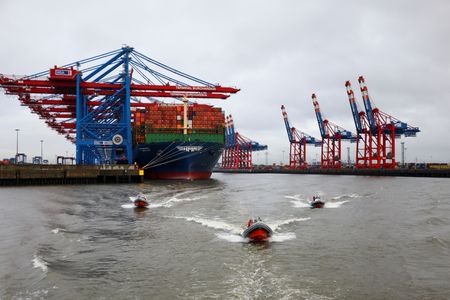By Maria Martinez
BERLIN (Reuters) -Protectionist tendencies are complicating foreign business for German companies, particularly in the United States, and postponing a recovery in exports, a survey by the German chamber of commerce DIHK showed on Thursday.
“The growing trade barriers and protectionist signals from Washington are causing great concern for our companies,” said Volker Treier, head of foreign trade at DIHK.
U.S. President Donald Trump’s newly announced 25% tariff on imported vehicles to the U.S. will be bad for European and U.S. economies, German auto associations said, calling for urgent negotiations to rein in a spiralling trade dispute.
Of the companies surveyed, 70% expect a negative impact on business due to U.S. trade policy, while last year, the U.S. was considered a beacon of hope.
The survey, conducted before Wednesday’s announcement by Trump, took place among nearly 2,600 internationally active companies based in Germany.
“What we see with the Trump administration is primarily chaos, and chaos always means planning uncertainty,” said Christoph Schemionek, head of the Delegation of German Industry and Commerce in Washington.
DIHK’s Treier believed the uncertainty could be advantageous for Germany and Europe.
“We are currently perceived as a safe, reliable investment partner,” Treier said. “We have to seize that and move it forward.”
That uncertainty radiates to many parts of the world, DIHK said in its report, and despite slight upward trends, business prospects for 2025 remain negative in almost all world regions.
In the U.S., higher tariffs already pose a burden for half the German companies active there, while last year, it was 24%, according to the survey.
Customers will ultimately pay the price, Schemionek said. “Cars will become significantly more expensive (in the U.S.), and auto manufacturers expect the market to crash initially because customers will stop buying new cars.”
(Reporting by Maria MartinezEditing by Ludwig Burger and Bernadette Baum)







